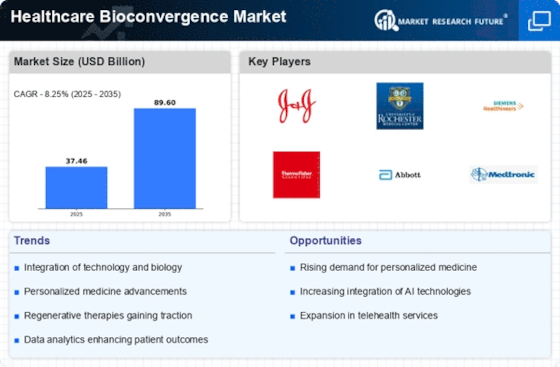Market Share
Healthcare Bioconvergence Market Share Analysis
The Healthcare Bioconvergence Market is experiencing significant changes as biological sciences blend with information technology and engineering to create new approaches toward healthcare challenges. This warms up the Healthcare Bioconvergence Market by bringing together biological sciences with other disciplines like nanotechnology, artificial intelligence (AI), and digital health, which promotes a multidisciplinary approach to healthcare innovation. In addition, there has been an increase in the number of advanced diagnostic tools and biosensors being developed in the Healthcare Bioconvergence Market. Miniaturized biosensors that connect with smartphones or other devices are becoming more popular, leading to real-time monitoring of health outcomes on a fast pace level." These innovations also contribute to the early diagnosis of diseases, personalized diagnostics, and a shift from a reactive mode towards a proactive /preventive healthcare system. The market is also going a long way toward precision medicine and personalized healthcare. This basic understanding of individual variation in health and disease is driven by progress in genomics, proteomics, and other -omics technologies. For this reason, collaborations and partnerships between traditional healthcare players, technology companies, and startups are playing a pivotal role in shaping the Healthcare Bioconvergence Market. These alliances facilitate the integration of ideas across various platforms, the development of integrated solutions, as well as convergence of innovations into multiple domains. Furthermore, more research funding has propelled advances in bioconvergent technologies that have resulted in novel medical devices, therapies, and diagnostic platforms. In response to changes within its setting due to the increased adoption of regenerative medicine and tissue engineering methods that are promoting innovative developments in regenerative therapies, bioconvergent technologies are used to create synthetic tissues such as organoids or personalized implants. The intersection of biological sciences with engineering principles holds great promise for revolutionizing organ transplantation procedures along with tissue repair mechanisms as well as applications related to regenerative medicine approaches. While exploring options for bioelectronics and neuromodulation for healthcare apps, there has been an increase in the market in this aspect. This marriage between biology and electronics has given rise to bioelectronic devices that can interface with the nervous system, thereby opening new opportunities for treating chronic illnesses and neurological disorders besides improving human health.



















Leave a Comment